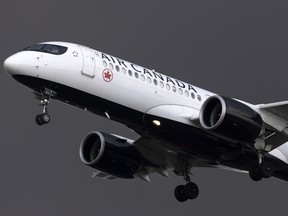
Article content
A 99.7-per-cent strike vote sounds dramatic — until you understand the law, and the games unions play.
THIS CONTENT IS RESERVED FOR SUBSCRIBERS ONLY
Subscribe now to read the latest news in your city and across Canada.
- Exclusive articles from Barbara Shecter, Joe O'Connor, Gabriel Friedman, and others.
- Daily content from Financial Times, the world's leading global business publication.
- Unlimited online access to read articles from Financial Post, National Post and 15 news sites across Canada with one account.
- National Post ePaper, an electronic replica of the print edition to view on any device, share and comment on.
- Daily puzzles, including the New York Times Crossword.
SUBSCRIBE TO UNLOCK MORE ARTICLES
Subscribe now to read the latest news in your city and across Canada.
- Exclusive articles from Barbara Shecter, Joe O'Connor, Gabriel Friedman and others.
- Daily content from Financial Times, the world's leading global business publication.
- Unlimited online access to read articles from Financial Post, National Post and 15 news sites across Canada with one account.
- National Post ePaper, an electronic replica of the print edition to view on any device, share and comment on.
- Daily puzzles, including the New York Times Crossword.
REGISTER / SIGN IN TO UNLOCK MORE ARTICLES
Create an account or sign in to continue with your reading experience.
- Access articles from across Canada with one account.
- Share your thoughts and join the conversation in the comments.
- Enjoy additional articles per month.
- Get email updates from your favourite authors.
THIS ARTICLE IS FREE TO READ REGISTER TO UNLOCK.
Create an account or sign in to continue with your reading experience.
- Access articles from across Canada with one account
- Share your thoughts and join the conversation in the comments
- Enjoy additional articles per month
- Get email updates from your favourite authors
Sign In or Create an Account
or
Article content
Earlier this week, nearly 10,000 Air Canada and Rouge flight attendants, represented by the Canadian Union of Public Employees (CUPE), voted overwhelmingly to authorize a strike. On paper, it’s an impressive show of unity. In practice, it may be a misfire.
Article content
Article content
Article content
Because while CUPE has the numbers, Air Canada has the legal advantage — as does the federal government.
Article content
By signing up you consent to receive the above newsletter from Postmedia Network Inc.
Article content
Air Canada is not some provincial warehouse or downtown café. It is a federally-regulated transportation carrier under the Canada Labour Code, which means any job action is subject to mandatory conciliation, cooling-off periods and ministerial intervention.
Article content
Let’s lay out the facts:
Article content
- The union completed conciliation in July.
- The 21-day cooling-off period ends August 15, meaning a strike or lockout could begin as early as August 16.
- But that does not mean it will happen, or that it will be allowed to continue.
Article content
Air travel can be viewed as an an essential service, particularly during the summer, when Canadians rely on the national carrier to travel across the country and around the globe. Ottawa has legislated workers back to work in far less disruptive industries.
Article content
Consider the precedents:
Article content
- Canada Post, 2018: The Trudeau government passed legislation ending rotating strikes by postal workers as Christmas deliveries were peaking.
- CP Rail, 2022: Back-to-work legislation was threatened — and the mere signal by the labour minister was enough to end the strike within days.
- Air traffic controllers or longshore workers have all, in recent memory, faced legislative constraints due to the essential nature of their work.
Article content
Article content
If a summer travel strike strands hundreds of thousands of Canadians, Ottawa will face enormous public pressure to intervene. And the current government — already increasingly unpopular due to Prime Minister Mark Carney over-promising a prospective deal with Donald Trump and being elected based on what turned out to be an illusory relationship with the U.S. president — will have no political appetite to side with the union over angry vacationing voters.
Article content
Article content
CUPE has framed this vote as a response to poor compensation and unpaid time. But Air Canada flight attendants already earn materially more than many of their North American counterparts. They have generous benefits and significant job security. Their argument about unpaid work — such as boarding time — would, if successful, upend industry-wide compensation models and impose massive costs on the employer. And airlines are in a tough, competitive industry with little room for financial overpayment.
Article content
Unions always tell their members to vote in favour of a strike, even if the do not intend to go through with it. Less than a near-unanimous vote, they assure their members, will signal to the employer that there is not enough appetite to strike, thereby vitiating their bargaining power. Vote to strike, they in essence say, so we won’t have to.

.jpg) 2 hours ago
1
2 hours ago
1
 English (US)
English (US)